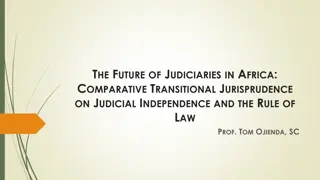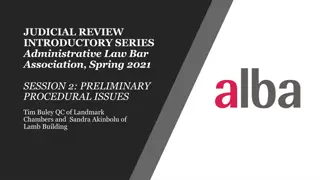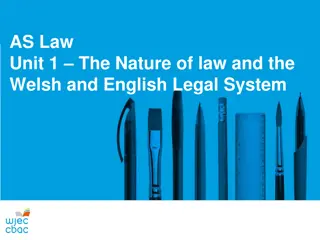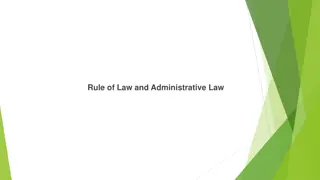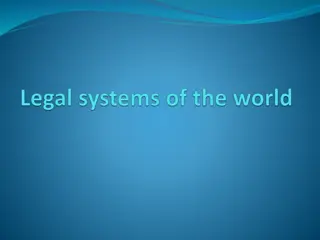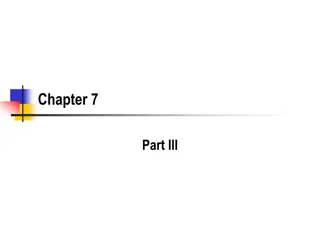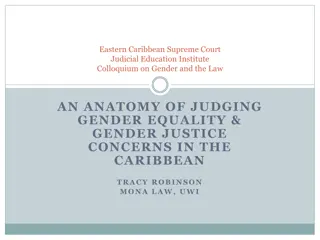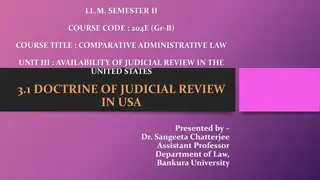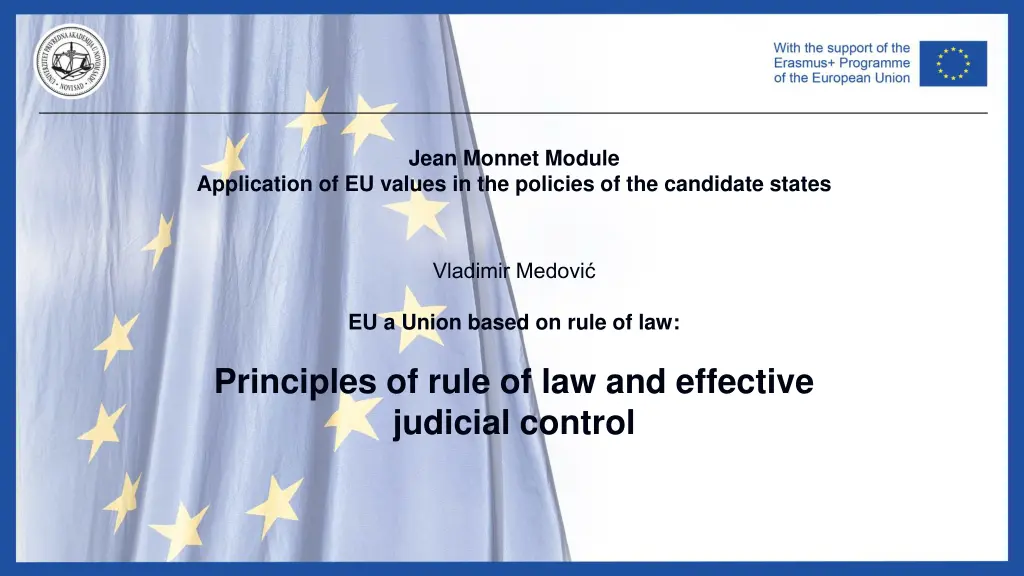
Principles of Rule of Law in the EU: Application and Manifestations
Explore the significance of the rule of law in the European Union, focusing on its principles, application, and manifestations. Understand how the EU values democracy, fundamental rights, and judicial control. Learn about equality of EU citizens, effective judicial protection, and the role of independent courts in upholding the rule of law. Discover the legal framework ensuring equal treatment, remedies for legal protection, and the right to a fair trial within the EU context.
Download Presentation

Please find below an Image/Link to download the presentation.
The content on the website is provided AS IS for your information and personal use only. It may not be sold, licensed, or shared on other websites without obtaining consent from the author. If you encounter any issues during the download, it is possible that the publisher has removed the file from their server.
You are allowed to download the files provided on this website for personal or commercial use, subject to the condition that they are used lawfully. All files are the property of their respective owners.
The content on the website is provided AS IS for your information and personal use only. It may not be sold, licensed, or shared on other websites without obtaining consent from the author.
E N D
Presentation Transcript
Jean Monnet Module Application of EU values in the policies of the candidate states Vladimir Medovi EU a Union based on rule of law: Principles of rule of law and effective judicial control
Principle of rule of law All public powers always act within the constraints set out by law, in accordance with the values of democracy andfundamental rights, and under control of independent and impartial courts The ruele of law includes principles such as: 1. Legality (transparent, accountable, pluralistic, democratic process for enacting laws) 2. Legal certainty 3. Prohibiting of arbitretry exercise of executive power 4. Effective judicial protection by independent and imaprtial courts 5. Separation of powers 6. Equality before the law
Principle of rule of law in the EU Principle of rule of law proclaimed in Art. 2. TEU An EU based on the premise that all member states share the same values and are based on the rule of law The functioning of the EU depends on the mutual trust of the Member States that these values will be respected and that EU law will be applied in all Member States. EU law must be interpreted and applied in the same manner in all Member States (principle of homogeneity) The EU Court of Justice and national courts ensure that EU law is observed and fully implemented The principle of mutual trust and the principle of mutual recognition of court decisions Independence of the courts is a precondition for the rule of law
Manifestations of the principle of rule of law Principle of equality of EU citizens - equal treatment of EU citizens by the Union institutions (Article 9 TEU) Principle of effective judicial protection (Article 19 TEU): Member States shall provide remedies sufficient to ensure effective legal protection in fields covered by EU law The principle of effective judicial protection derives from the general principle of EU law proclaimed in the judgment of the Court of Justice (Les Verts, C- 294/83) The EU is based on the rule of law inasmuch as neither Member States nor its institutions cannot avoid the review whether the measures adopted by them are in accordance with the basic constitutional charter, the Treaty The right to an effective remedy and a fair trial: everyone whose rights and freedoms, guaranteed by Union law, are violated has the right to an effective legal remedy before an independent and impartial tribunal (Article 47 of the EU Charter of Fundamental Rights)
Principle of effective judicial controle Applicable to all fields covered by EU law, regardless whether or not Member States apply EU law in a particular case Member States have a duty to ensure that their courts meet the requirements for effective judicial protection - a complete system of remedies The integrated nature of the EU judicial system The preliminary ruling procedure - instrument of cooperation between the EU Court of Justice and national courts Precondition: independence of the courts - to perform their function completely autonomously, without hierarchical restrictions, not to be subordinated to any other body, not to receive orders or instructions from any source, to be protected from external intervention or pressure that may reduce the decision-making independence of its members or influence their decision
New initiatives for strenghtening the rule of law April 2019. EC registered a European Citizens' Initiative entitled Respect for the rule of law within the European Union' Establishment of an objective and impartial evaluation mechanism to verify the application of the European Union's values by all the Member States Easier application of Art. 7 TEU April 2019 The EC opens a debate on strengthening the rule of law in the EU In July 2019, the EC adopted new measures to strengthen the rule of law: Dissemination of knowledge and culture of the rule of law (civil society, academic community, education system, national parliaments ...) Early prevention: cooperation and assistance at the national level, preservation of judicial independence, annual rule of law report EU-specific response to violations of the rule of law: New rule of law mechanism, proceedings before the Court of Justice, application of Article 7 TEU 1. 2. 1. 2. 3.
Principle of the rule of law in the jurisprudence of the EU Court of Justice Judgment of the Court of Justice in the case of the Associacao Sindicals dos Juizes Portugueses, C-64/16, of 27 February 2018. Judgment of the Court of Justice in the LM case, C-216/18 PPU, of 25 July 2018 Judgment of the Court of Justice in the case of EC v. Poland, C- 619/18 of 24 June 2019 Judgment of the Court of Justice in joined cases C-924/19 PPU and C-925/19 PPU, of 14 May 2020





